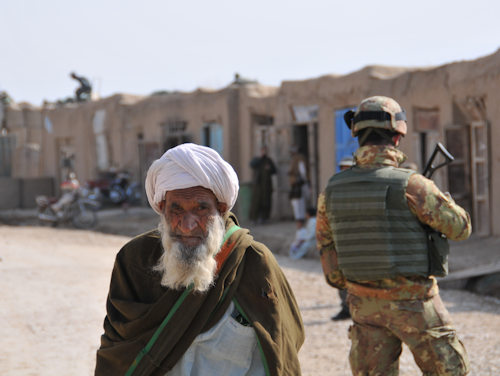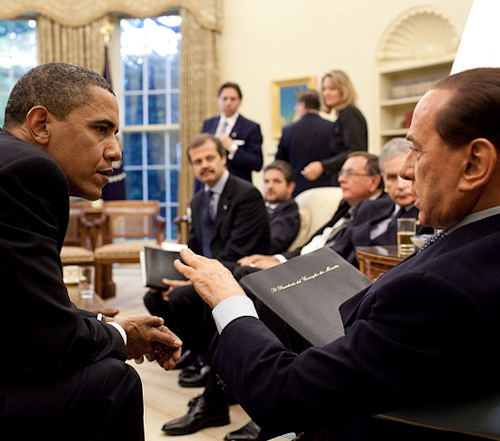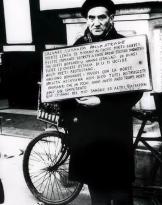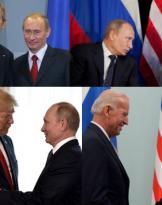Around the world ofintelligence legends fueled by the mystery that surrounds this type of activity revolve. Writers and film producers are well aware of the hold the topic has on the public. When some real facts emerge, such as the expulsions in recent weeks of numerous diplomats from various European, Russian and American embassies, the arrest of characters who sell classified information to the adversary or the acquisition of means for surveillance (v. article) everyone's fantasies ignite and roam excitedly in the infinite sea of imagination.
However, the work of intelligence it is often far from exciting. Apart from those (the spies) who are physically in charge of collecting or verifying information by stealing it from the (potential) adversary, the work of intelligence is based on the evaluation of a considerable amount of information, correlating the most secret (and difficult to obtain) with those obtainable from the so-called "open sources", that is, available to all as websites, newspapers, specialized magazines, books, photos, etc ... Practically more a bookworm job like the "Condor" (from the beautiful book by James Grady) than an athletic and fascinating character like James Bond. Nevertheless, the work of analyzing and evaluating information, essentially a challenge between brains (or intelligences), can reserve considerable satisfactions.
What is theintelligence
The term intelligence originates from the Latin intelligence and it means “knowledge, knowledge of someone, of something”. It is therefore an activity that has as its purpose the acquisition of knowledge in a certain sector, which may pertain to the military sphere (such as the consistency and preparation of the Armed Forces of another country), anti-crime or anti-terrorism (such as the structure and activities of criminal / terrorist organizations), industry (such as the overall technological level reached and the activity in the weapons systems sector). L'intelligence, therefore, it is an activity related to the sphere of knowledge, the result of which is auseful information that is sought, collected, filtered, evaluated, integrated, compared, interpreted and valued in order to be, as far as possible, complete, accurate and timely, in order to allow the decision maker (politician, military, investigative or entrepreneur) to know, form an idea and establish the consequent actions.
In fact, each of us unknowingly does a job every day intelligence in the course of their daily activities. When you decide to buy one product instead of another, in fact, you have done a simple job of intelligence through the collection and evaluation of all information from available sources (internet, posters, advertisements, etc ...) to be able to choose the product that best meets your needs.

It is obvious that the civilian and military personnel it deals with intelligence it performs its functions at a greater level of depth and deals with much more sensitive information than what is dealt with when deciding whether to buy one car rather than another. The higher the decision-making level, the greater the delicacy of the work being carried out.
Taking into consideration the strategic aspects of the work of intelligence we can, therefore, affirm that the knowledge that derives from this allows the formation of a foreign policy and the modulation of relations with other countries, both from a security and defense point of view as well as from an industrial and economic perspective. If foreign policy is the "shield" of the country, as Walter Lippman defined it, theintelligence it is therefore the tool that allows the shield to be in the right place at the right time. And it is also the tool by which it is eventually possible to guide the "sword". It is therefore an indispensable work to ensure the well-being and safety of citizens, to improve their way of life and to provide the cognitive tools for the protection of the country, its ideals and interests.
Information gathering mainly consists of two operational areas: surveillance and research. Surveillance, as understood inintelligence, is the passive observation of what happens in the other's field. The observation process can be overt, occult, or a combination of the two. Research is, on the other hand, an active process that allows us to unravel the opponent's ability and his weaknesses. To achieve one's goals, research is often conducted covertly.
In this context it should be emphasized that the "cycle ofintelligence”Does not present a solution of continuity, as the work restarts immediately after providing the decision maker with the information required because, in turn, these generate new information needs and new requests for further information. The cycle can be summarized starting from the request phase, in which decision makers determine a question based on their strategic needs. A phase of planning follows, during which the ways of acquiring information are identified, and collection, more or less secret and more or less risky depending on whether we are talking about political, military, anti-crime or industrial information. .
Once you have the information, you can continue with the analysis and production phase of theintelligence actual, which will at this point be distributed both to the original applicants and to all the structures that are supposed to benefit from it.
 The sources of intelligence
The sources of intelligence
In the world ofintelligence, the term "source" indicates any source of information. In the recent past, all espionage, first between the allies and the Nazi bloc and later between the two blocs of the Cold War, was based on the figure of the informant, the defectionist or the infiltrator and the term "source" referred to these characters, as this was basically the only way to get information about the opponent. Nowadays, with the enormous technological progress of electronics, in addition to the historical figure of the informant, it is possible to resort to various other sources such as, for example, the corporate, satellite photography, environmental interception, clandestine recording of electromagnetic emissions and communications. In addition to the classic HUMINT (Human Intelligence), we now have a great variety of sources, which can be grouped under the generic name of TECHINT (TECHnical INTelligence), intelligence collected through technological means, or OSINT (Open Source Intelligence).
Technological development, the birth of the global village, the new geopolitical contingencies and the growing dematerialization of the economy today pose an unprecedented challenge to all operators in the sector, but also offer new opportunities for gathering information. The change in the political, military and economic / industrial competition at an international level has, in fact, forced us to take new paths for gathering information. In the new opposition between the Western bloc and the world of Islamic religious fanaticism or international terrorism, for example, it is no longer possible to think of easily infiltrating an Islamic or terrorist group, often based on very close family or tribal ties.1nor to convince people motivated by deeply rooted religious convictions to defect. The case of industrial espionage is different, where HUMINT remains one of the cornerstones of information gathering, both through direct contact with the employee of the "enemy" company and through the work of characters who, despite being strangers to the company, have easy access to data, such as cleaning staff or IT consultants.
TECHINT is mainly used to collect information regarding the foreign Armed Forces (armament, equipment, consistency, location, etc…). Knowledge, for example, of the characteristics and capabilities of the opponent's weapons allows the development of adequate countermeasures capable of reducing (or hopefully canceling) their effectiveness. It began during the First World War, with the first aerial photographs of the enemy camp, and the advancement of technology has then opened other avenues for the collection of information, allowing the transfer of communication on electronic or digital means, and becoming today senz ' other the first source of military information supply. Nowadays, in fact, any electromagnetic emission or human communication is virtually interceptable and acquirable by anyone, if anything, the problem remains of how to deal with the enormous amount of data collected and how to identify the important information.
 In the case of information from open sources (OSINT), the problems are related to the overabundance of data, sometimes at the limit of saturation, which often makes it difficult, if not impossible, to retrieve the desired information. In fact, among the billions of information available, only a few are really useful and their identification is not at all easy. The Internet is a shining example of a resource of this kind, although it is not the only one nor necessarily the best. The lack of information from these sources is now a very rare phenomenon, yet one could cite examples of unsuccessful surprises whose "retrospective" study revealed that all necessary and relevant information had been or could have been gathered. To help in the selection of information from open sources, various tools have therefore been developed to help the operator of theintelligence in its task, by the tools of DataWareHouse al Data Mining and Text mining. It is clear that open sources do not allow the acquisition of secret information, which is the true purpose of the work of intelligence, but they often allow you to determine scenarios or indirectly confirm information collected with other systems.
In the case of information from open sources (OSINT), the problems are related to the overabundance of data, sometimes at the limit of saturation, which often makes it difficult, if not impossible, to retrieve the desired information. In fact, among the billions of information available, only a few are really useful and their identification is not at all easy. The Internet is a shining example of a resource of this kind, although it is not the only one nor necessarily the best. The lack of information from these sources is now a very rare phenomenon, yet one could cite examples of unsuccessful surprises whose "retrospective" study revealed that all necessary and relevant information had been or could have been gathered. To help in the selection of information from open sources, various tools have therefore been developed to help the operator of theintelligence in its task, by the tools of DataWareHouse al Data Mining and Text mining. It is clear that open sources do not allow the acquisition of secret information, which is the true purpose of the work of intelligence, but they often allow you to determine scenarios or indirectly confirm information collected with other systems.
The information collected as a whole is then put into the system, evaluated, interpreted and valued. One of the methods by which this work is carried out is the so-called "SWOTanalysis", Which takes into account the strengths (Strengths) and weaknesses (weaknesses) of a certain organization, comparing them with opportunities (Opportunities) it offers and the threats (Threats) related to it. The analysis of the balance of power with the opponent, the evaluation of the political balance and economic potential of the country, the study of alliances in progress can lead to exceptionally important results in predicting the attitude of the potential opponent.
However, it should be borne in mind that no method of acquiring and evaluating information and no source, not even the most reliable, can, in any case, completely eliminate the seed of uncertainty or predict unexpected behaviors.
THEintelligence Nowadays
As Michael Herman writes2,intelligence has as its object the opponent, both internal and external. This translates into a series of activities carried out towards States, organizational structures and / or individuals, considered hostile, rival, competitive or otherwise of interest for the achievement of specific objectives, which can be political, military, investigative or even cheap.
 The "game" of spies, which tends to steal the greatest number of valuable information from the adversary, has therefore never really ceased, despite the fall of the "Iron Curtain". The fact is that, as team admiral Sergio Biraghi states in an interview granted to a newspaper, “… The rules are always the same, they try, we have to prevent it. But it's also the other way around, we try too ... ". Not only that, as the case of the interceptions of the leader Europeans arranged by Barack Obama, a certain level of "curiosity" is also directed towards those who are part of the same camp. Extending what is written by S. Sontag and C. Drew3, the services of intelligence from all countries behave exactly like players playing poker in a smoke-filled room. Everyone cheats, but no one can blame others, otherwise the game is over.
The "game" of spies, which tends to steal the greatest number of valuable information from the adversary, has therefore never really ceased, despite the fall of the "Iron Curtain". The fact is that, as team admiral Sergio Biraghi states in an interview granted to a newspaper, “… The rules are always the same, they try, we have to prevent it. But it's also the other way around, we try too ... ". Not only that, as the case of the interceptions of the leader Europeans arranged by Barack Obama, a certain level of "curiosity" is also directed towards those who are part of the same camp. Extending what is written by S. Sontag and C. Drew3, the services of intelligence from all countries behave exactly like players playing poker in a smoke-filled room. Everyone cheats, but no one can blame others, otherwise the game is over.
This means that, in a world in which international relations are increasingly governed by mutual distrust and competition and only very rarely characterized by parallel work, the work of intelligence and the search to know the true intentions of the geopolitical adversary or the competitors economic occupy a prominent place among the information contributions given to the decision maker.
The work of intelligencemoreover, it is becoming more and more complex and specialized. This has prompted the constant refinement of information research, the acquisition of new skills and the updating of reading keys and interpretative paradigms. The skills required to access this world are today less and less "muscular" and adventurous, with all due respect to the nice James Bond, but range from the most well-known and common disciplines (psychology, history, engineering in its various specializations, chemistry, geopolitics, etc. ...) to the less predictable ones (economics, finance, international relations, history of religions, sociology, anthropology, communication science, rare languages, etc ...), without neglecting a good background technological.
In all this, the Embassies, the political buildings, the centers ofintelligence, the General Staffs and companies dealing in arms or high technology will continue to be the inevitable theater of lively espionage intrigues. While some operators of intelligence rely on their Embassies, under various diplomatic covers, to carry out their work of gathering information inside the buildings where strategic decisions are made and where secret information and classified correspondence are kept and processed every day, on the other hand the diplomatic seat itself is always the object of the desire ofintelligence of the host country. The case of the Officer serving in the Italian Defense Staff, surprised while passing classified documents to a Russian officer serving at his Embassy in Rome, in exchange for money, is a typical example, such as the case of Kim Philby. , the agent ofintelligence British who revealed to the KGB the identity of many of his colleagues, including that same John le Carré who would later achieve success with his spy novels.
 In this context, the recruitment process for HUMINT provides for an initial identification of the target, which must be correlated to the identified information objective, then follows a phase of approach and evaluation of his motivations and his future loyalty and availability, followed by the evaluation of the material received. To be identified as target, it is not essential to hold a top position, nor to normally deal with classified material, but it is often sufficient that your position allows you to enter the rooms where such material is used by others. As for the second phase, which begins with the approach, it can take place in various ways, all apparently "innocent" or "casual" such as receptions, concerts, sporting events, etc ... This phase is followed by that of evaluating the reasons , on which many studies have been carried out, both of a social and psychological nature, to identify and classify the salient characteristics that make the human nature more or less prone to "betrayal".
In this context, the recruitment process for HUMINT provides for an initial identification of the target, which must be correlated to the identified information objective, then follows a phase of approach and evaluation of his motivations and his future loyalty and availability, followed by the evaluation of the material received. To be identified as target, it is not essential to hold a top position, nor to normally deal with classified material, but it is often sufficient that your position allows you to enter the rooms where such material is used by others. As for the second phase, which begins with the approach, it can take place in various ways, all apparently "innocent" or "casual" such as receptions, concerts, sporting events, etc ... This phase is followed by that of evaluating the reasons , on which many studies have been carried out, both of a social and psychological nature, to identify and classify the salient characteristics that make the human nature more or less prone to "betrayal".
It is certainly essential to draw a very detailed picture of the potential informant, in order to be able to identify potentialities and gaps. In this perspective, physical and aesthetic characteristics, health status, personal and family history, character and temperament, ideological assumptions, social behavior and habits, work and the acquired social environment are analyzed. For each of these characteristics, a detailed list of the information to be acquired is then presented until a complete picture of the figure is obtained. The recruiter, once the target has been identified, throws the hook and waits for the desired fish to bite, initially accepting hospitality, "friendship" and favors from the "fisherman". Such offers of favors often encourage some vices or standard of living, which lead to compromise and, therefore, blackmail.
As far as TECHINT is concerned, the progress of electronics has now allowed the preparation of devices that are increasingly suitable for the collection and selection of the information requested. More and more compact bugs, submarines, airplanes, ships and satellites that host optoelectronic systems with ever increasing capabilities and ever greater possibilities of capturing and recording electromagnetic emissions allow you to theoretically keep under control any possible adversary wherever he is.
Conclusions
George Washington (1732-1799) used to say that "... the need to obtain good information is evident and deserves no further discussion ..." and the Duke of Marlborough (1650-1722) liked to emphasize how "... no war can be fought successfully without timely and secure information… ". Claims that no politician, military or company boss would ever dream of contesting.

From the beginning, the collection of vital information has been useful to prevent or mitigate enemy attacks or to beat an economic competitor. From the Sumerians, in 4.000 BC, to the Egyptians, the Greeks, the Romans, everyone built and employed an information service, with the aim of letting them know in advance the intentions of neighboring countries or neighboring city-states.
Even in the Bible, reference is made several times to the work of intelligence where, for example, the Lord suggests that Moses send spies to gather information on the land of Canaan, promised to the Jewish people4. In more recent times, Francis Walsingham, head of espionage for Queen Elizabeth I, set up an international spy network to facilitate British commercial penetration and the conquest of colonies. Or even the famous Turk Cicero who, during the Second World War, passed to the Germans the secret documents that the British Ambassador to Turkey, Sir Hugh Knatchbull-Hughessen, left imprudently on his desk. Finally, Richard Sorge, who became press officer of the Nazi Embassy in Tokyo and advisor to Ambassador Eugen Ott, a position that allowed him to warn Stalin of the Japanese decision not to attack Russia from the east, allowing him to move his troops from the front. east to face the advancing Germans in the west.
However, that pioneering work could make use of extremely rudimentary tools, when compared to those available today, and often only needed brave men who worked undercover to steal the secrets of the adversaries.
Today the operator of intelligence on the other hand, it has a much broader vision of its activity than in the past, no longer only military / operational but also political / evaluative, capable of providing the decision-maker with useful information for a better understanding of increasingly complex and difficult to decipher international realities . With the end of the bipolar world and the birth of unprecedented and non-state phenomena such as confessional terrorism, with the growing difficulty of defending oneself in a world that is constantly changing and radically different from the one we found when we were born, in which conflicts they are not necessarily generated between states, in which the enemy is hardly identifiable with certainty, the activity of intelligence it tends to become global and multidimensional, in order to discover all the secrets that the potential adversary hides.
 In the past it was not uncommon for decision makers who wanted to directly access the material collected from the sources to get a direct idea of the situation but, with the enormous amount of data and information available today, such an approach is no longer sustainable, also because the information, without adequate evaluation and processing, has an extremely limited meaning. The growing amount of “raw” data available makes the operator of intelligence increasingly indispensable at the decision-making level. The figure of the operator, who provides a finalized product that can be used in the decision-making process, thus becomes irreplaceable for the decision-maker.
In the past it was not uncommon for decision makers who wanted to directly access the material collected from the sources to get a direct idea of the situation but, with the enormous amount of data and information available today, such an approach is no longer sustainable, also because the information, without adequate evaluation and processing, has an extremely limited meaning. The growing amount of “raw” data available makes the operator of intelligence increasingly indispensable at the decision-making level. The figure of the operator, who provides a finalized product that can be used in the decision-making process, thus becomes irreplaceable for the decision-maker.
The role ofintelligence is, therefore, of utmost importance in an era of continuous danger and heated economic rivalry, in which the "... chronicization of conflicts and disputes, also due to projections of influence by third States, the difficulties of multilateral mediation , the antagonism between global players and the race for primacy on the technological side, the regionalization of production chains and the repositioning of actors and operators in global value chains, the growing aggressiveness of economic competition and the consolidation of articulated and multiform ... "5 they require responses that are ready, aware and coherent.
This is why this work has been and always will be indispensable in supporting the decision-maker in his difficult task.
1 See Renato Scarfi, Terrorism jihadi, Europa Edizioni, Rome, 2019
2 See Michael Herman, Intelligence Power in Peace and War, Cambridge University Press, 1996
3 Sherry Sontag and Cristopher Drew, Quick dive, The Assayer, 1998
4 Bible, Pentateuch, Numbers 13: 1,20
5 Presidency of the Council of Ministers, Report on information security policy 2020
Photo: web / US Marine Corps / Defense Staff / The White House / Prime Minister's Office












